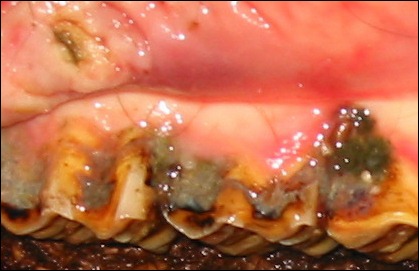
0345 095 9995 Out of hours call 07966 367746
© Dukes Vet Practice 2013, 2014, 2015

Dukes Equine Vets Ltd
Dentistry
Dukes Vet Practice aims to provide the best possible dental care for your horse. All our vets have attended British Equine Veterinary Association run dentistry courses including advanced courses covering the latest theories and techniques.
Polo was one of the first equine sports to recognise the importance of performance dentistry and so Jim, through polo has been very involved with equine performance dentistry for more than 25 years. There is a big difference between rubbing a rasp around a horses’ mouth and real attention to detail to ensure that the mouth is as healthy as possible without any problems that may adversely affect the horses’ performance or ability to eat! As a team we regularly look at horses together to ensure we are all working to the same high standards.
Inside a horses mouth with diastema, gum disease and note ulceration on inside of the cheek too!
 We have invested in plenty of specialised equipment including two motorised rasping sets, diastema burrs and top quality hand floats to be able to tackle both routine and abnormal dentistry. We undertake extractions of both wolf teeth and molar teeth. Wolf teeth are small vestigial (not really functional) teeth at the front of the molar arcade. In some horses these seem to cause no problems but in others they can cause great discomfort and subsequent bitting or riding issues. Wolf teeth should only be removed under sedation and local anaesthesia.
We have invested in plenty of specialised equipment including two motorised rasping sets, diastema burrs and top quality hand floats to be able to tackle both routine and abnormal dentistry. We undertake extractions of both wolf teeth and molar teeth. Wolf teeth are small vestigial (not really functional) teeth at the front of the molar arcade. In some horses these seem to cause no problems but in others they can cause great discomfort and subsequent bitting or riding issues. Wolf teeth should only be removed under sedation and local anaesthesia.
Whilst wolf teeth are usually relatively straightforward to remove, molar teeth can present a major challenge to remove. Removing a molar tooth from a relatively young horse can easily take two hours or more due to the fact that about 85% of the tooth is below the gum line. However with specialised extraction instruments we perform molar extractions on a fairly regular basis. In many cases molars are removed because of advanced gum disease but extraction is not the answer for every case: unless a tooth is obviously loose we investigate each case carefully to ensure the treatment is appropriate.
As well as carrying out dentistry for our own clients we look at cases as second opinions and regularly get referrals from other vets and equine dental technicians (EDTs).
Good dentistry can make an enormous difference to some horses and it is vital to ensure that you use a suitably trained and competent person to carry out the task. You should be aware that “dentist” is a reserved name for human dentistry and it is not strictly legal to use the term “horse dentist”. We will work with BEVA registered EDTs but cannot even give sedation for unqualified personnel to rasp your horses teeth.




